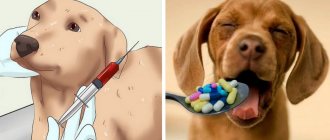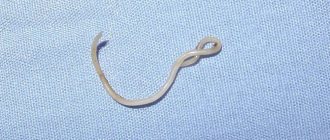Kidney disease in dogs is a condition in which the organ becomes so damaged that it cannot function properly. It stops removing toxins from the blood, regulating blood pressure, and producing substances that improve the synthesis of red blood cells, the metabolism of calcium and vitamin D. This causes serious disruptions in the functioning of many organs and systems. If the disease progresses, chronic renal failure develops, which leads to the death of the animal.
How the kidneys work
Plasma purification occurs according to the following scheme:
- Blood enters the organ through the renal artery and leaves the renal vein.
- Poisons are filtered in nephrons, which are presented in the form of a huge number of microscopic units. Each nephron has a complex structure in the form of glomeruli (clusters of capillaries) and a system of tubules, enclosed in a capsule that protects it from external influences.
- After processing, the sifted toxins enter the renal pelvis, then the ureter and bladder.
- When the level of fluid in the bladder reaches a certain volume, it sends a signal to the brain that it is time to empty itself.
- A toilet-trained pet begins to behave restlessly and asks to go outside.
Thus, the kidneys remove the end products of nitrogen metabolism from the body - urea, ammonia, uric acid, purine bases. They cleanse the body of foreign and toxic compounds (including removing medications), excess fluid, and excess inorganic and organic substances.
What is this?
Kidney failure is a dangerous disease that involves impaired filtration function. The kidneys are unable to remove dangerous and toxic substances from the blood that are formed during life.
In addition to eliminating toxins, the kidneys:
- remove excess fluid from the body;
- maintain normal blood pressure;
- promote the production of certain hormones;
- participate in the metabolism of calcium, vitamin B3 and phosphorus.
There are many reasons for the development of this pathological condition in a dog. The disease may be the result of injury, age-related changes or genetic predisposition. In most cases, kidney failure affects individuals over the age of 8 years.
Kidney disease in dogs: symptoms
The kidneys are a tenacious organ; necrosis of its tissues develops slowly, so the first symptoms of the disease are blurred and unnoticeable. Contact your doctor for advice and treatment if your pet begins to drink more and urinate a lot, has no appetite, or is losing weight.
Other signs of kidney disease in dogs:
- high blood pressure;
- blurred vision;
- damage to the nervous system;
- weakness;
- apathy;
- lack of energy;
- drowsiness;
- depression;
- vomit;
- diarrhea;
- bad breath;
- poor condition of the coat.
In the last stages of the disease, the organ cannot cope with its work and produces urine poorly. The animal urinates little, toxins and end products of decay are not excreted and circulate in the blood.
Treatment of kidney failure
Treatment for both acute and chronic forms of the disease is carried out in the same way. The only difference is that in the case of acute development, the action will be aimed at eliminating the provoking factor, and in a chronic case, all treatment is aimed at restoring the pet’s strength.
Important ! The chronic form is considered incurable; all measures only help prolong the life of dogs.
List of medications for renal failure
The complex of drugs for the treatment of kidneys in dogs includes:
- Restorative and rehydrating solutions for infusion to eliminate dehydration. These drugs include: Ringer-Locke solution with glucose 40%; Nelit; recovery cocktails with glucose.
- Diuretics - Lasix, Manit.
- Protecting the gastrointestinal tract - Zantac, Omez.
- Antiemetics - Cerucal.
- Antihypertensive drugs - Vazosan.
- Antianemic and normalizing hematopoietic agents - Recormon, vitamin B12.
- Renoprotectors - Canephron.
- Sorbents and antitoxic agents - Enterosgel, Sirepar.
- To maintain heart activity - Riboxin.
- Antibiotics - Enrofloxacin.
- Glucocorticoid hormones - Prednisolone.
- Hemostatic agents - Dicynon.
Attention! It is strictly forbidden to self-medicate at home. This can lead to the death of the dog. All prescriptions should be made only by a doctor, taking into account the individual characteristics of the dog and the results of the examination.
The most common kidney diseases in dogs and their classification
The most dangerous condition is chronic renal failure. The disease develops gradually over many years and is a complication of other kidney pathologies. The disease is more common in older pets, in small breeds - after 10 years, in large breeds - after seven years.
The first symptoms of chronic kidney disease in dogs appear when the organ is 75% damaged and little can be done. For treatment, people are prescribed dialysis (regular blood purification through a special machine). Animals are deprived of this opportunity due to the lack of expensive equipment in veterinary clinics.
Acute renal failure
Unlike the chronic form, acute renal failure in dogs is a reversible condition. It is dangerous because the symptoms develop quickly, progressively, and without treatment the animal can die within a few days. The pet suffers from abdominal pain, cramps, fainting, gums and mucous membranes turn pale. Due to a sharp increase in pressure, blindness is possible.
Causes of acute renal failure
- Poisoning;
- drop in blood pressure;
- large blood loss;
- state of shock;
- postoperative stress;
- electric shock;
- severe dehydration;
- obstructed urine flow (stones, tumor);
- severe infectious diseases;
- burns;
- frostbite;
- abnormal fluid loss.
Pyelonephritis
Pyelonephritis in dogs is a bacterial infection of the renal pelvis, the funnel-shaped part of the ureter, and the renal tubules. The bacterium can penetrate both the ureter and the blood. Few people know, but problems with the oral cavity (caries, periodontal inflammation) can cause bacterial damage to the kidneys. Microbes enter the bloodstream and affect various organs - heart, liver, kidneys.
For pyelonephritis in dogs, treatment is prescribed taking into account the symptoms:
- Heat;
- blood in urine;
- difficulty or frequent urination;
- urine with an unpleasant odor;
- discolored urine;
- strong thirst;
- abdominal pain.
Diagnostics
Treatment of chronic renal failure in dogs is prescribed only after a comprehensive examination. It consists of the following activities:
- interviewing the pet owner about his lifestyle;
- laboratory tests;
- Ultrasound.
The diagnosis is made based on:
- appearance of the dog, degree of exhaustion;
- volume of urine excreted;
- an increase in the level of acidity in the blood and protein in the urine.
On ultrasound in acute renal failure, the kidneys will be slightly enlarged. During the chronic stage, they significantly decrease in size.
Laboratory tests play an important role in diagnosis
Stones in the kidneys
Kidney stones occur less frequently, and more often in the urinary tract. Main reasons:
- increased acidity of urine, due to which urea is poorly soluble, crystallizes and turns into stones;
- infrequent urination is the result of poor exercise or dehydration;
- increased levels of uric acid in the blood;
- medicines;
- urinary tract infections;
- food high in protein and salt;
- obesity.
Stones do not cause harm if their size is small and they lie quietly in one place. Problems appear when stones become dislodged, injure surrounding tissues, and block the ureter. The animal lies down, does not get up, and cannot turn around normally. Nausea, vomiting, and blood in the urine are possible. These symptoms require surgery.
Glomerulonephritis
Glomerulonephritis in dogs is the main cause of chronic renal failure, which is difficult to treat. This is the name of a group of diseases that affect the kidney glomeruli. The inflamed units die off and are replaced by connective tissue, causing the kidneys to no longer cope with their tasks.
The disease is based on an autoimmune reaction, when the immune system forms compounds that destroy kidney tissue. The trigger could be poisoning, bacterial or viral infections, or oncology.
The disease takes a long time to develop. Signs of kidney disease in dogs are mild and appear at a serious stage. Among them are shortness of breath, ascites, edema, and high blood pressure. The diagnosis can be suspected by a urine test that shows high levels of protein. To confirm the diagnosis, you need to do a blood test, ultrasound, and kidney biopsy.
Cancer
Primary kidney cancer is rare - carcinoma develops in older animals (60%). In most cases, the tumor arises in another part of the body; metastases reach the kidneys with good blood circulation.
Amyloidosis
Amyloidosis in dogs is a condition in which protein accumulates in the kidneys, disrupting the functioning of the organ, leading to kidney failure. The disease has a poor prognosis and amyloidosis is difficult to treat. The disease is inherited and is often found in Shar Peis, Akita Inu, and Beagles.
Breed characteristics
Unneutered cables are predisposed to the disease. Chronic renal failure is most often observed in elderly individuals.
In most cases, nephropathology is diagnosed in the following breeds:
- bull terrier;
- pinscher;
- Cocker Spaniel;
- German Shepherd;
- Doberman
The disease occurs quite rarely in young dogs.
Diagnosis and treatment of pyelonephritis in dogs
If your pet drinks a lot, urinates frequently, or eats little, take him to the doctor for diagnosis and treatment. If you suspect renal failure, you need to take a blood test for urea and creatinine. These substances are formed during the breakdown of proteins and are excreted in the urine, so there should not be a lot of them in the blood.
If symptoms indicate pyelonephritis in a dog, a urine culture should be done to identify the causative agent and determine treatment. You also need to do a blood test for albumin. This is a large protein that cannot pass through the kidney filtration system, so its presence in the urine indicates kidney failure.
Also, ultrasound, x-ray, and kidney biopsy may be needed for monitoring. At an early stage, a blood test for SDMA can help determine chronic renal failure in a dog. Its level increases in plasma even with minor organ damage.
Treatment of kidney disease in dogs
The doctor prescribes treatment based on test results. Pyelonephritis requires antibiotics. If a dog is found to have stones in its urinary tract, surgery or shock wave therapy may be necessary.
The pet must be on a special diet prescribed for kidney disease. The animal needs dog food for kidney disease, which contains a reduced amount of phosphorus and protein. If you give your pet dry food, refuse it in favor of wet food.
Treatment of kidney disease in dogs is aimed at preventing the loss of potassium in the urine, and special supplements are prescribed. Deficiency of this mineral causes muscle cramps and leads to kidney failure. If the level of phosphorus in the blood is high, drugs that bind it are needed. For example, Ipakitina will help normalize the metabolism of calcium and phosphorus.
Dogs with kidney disease often develop hypertension. To prevent organ destruction, medications are therefore needed to lower blood pressure. Less often, a sharp drop is observed (for example, in case of poisoning); in this case, drugs for hypotension are prescribed for treatment.
The kidneys of cats and dogs produce substances that stimulate the synthesis of red blood cells in the bone marrow. They are responsible for the transfer of oxygen to cells, which is involved in oxidative processes. Therefore, when nephrons are destroyed, dogs develop irreversible diseases. To prevent anemia, the doctor prescribes drugs for treatment that stimulate the synthesis of red blood cells.
Food for dogs with kidney failure
Treatment of renal failure should be carried out comprehensively, including diet. You can feed your pet natural foods or use ready-made food that is designed specifically for dogs with kidney disease.
The feeding principle should be based on the following rules:
- Products should be high in fat, since the dog does not have enough energy, it can replenish it with fats from food.
- Proteins should be given in limited quantities.
- Carbohydrates are a good source of vitamins and calories. It is recommended to include potatoes, rice, and semolina in your daily diet.
- Reduce your salt intake.
Important! You should absolutely not give your pet multivitamins with phosphorus or vitamin D.
Compliance with the correct diet plays an important role in the treatment of an animal.
Examples of diets for an adult dog weighing 20 kg (per meal)
Experts recommend sticking to the following diet. It is designed for a dog weighing 20 kg. During one meal, the animal can be offered:
- 200 gr. semolina porridge with 1 tbsp. l. ghee and 2 tbsp. l. cream. 1 egg white, 70 gr. You also need some vitamin supplements, for example salmon oil and ground shells are suitable.
- 200 gr. rice porridge with butter, 30 gr. liver or kidneys, 200 gr. chicken meat, 70 gr. vitamins
Important ! If a dog is diagnosed with chronic renal failure, it will have to follow a diet for the rest of its life.
Prevention of kidney pathology in animals
If you have an older dog or one that is genetically prone to kidney disease, monitor its health. Periodically give supplements that have a positive effect on the functioning of the organ and strengthen it. For example, Nephrodog prevents the development of urolithiasis, Renal Advance helps in the early and late stages of chronic renal failure.
Kidney disease in dogs can be avoided by following preventive measures:
- Do not keep the animal in the cold. If your pet lives in a kennel or enclosure, insulate it well, protect it from rain, and the floor should not get wet.
- The dog's sleeping place should not be in a draft.
- Vaccinate the animal on time and give anthelmintics.
- Keep your house in order, keep your pet away from household poisons - dishwashing detergents, toilet detergents, primers, medications.
- Feed the animal regularly and provide high-quality water. If your pet is sick, give him special food for dogs with kidney disease.
- Walk the animal well 2-3 times a day, preferably for at least an hour, so that the pet can defecate normally. If you have a young, mischievous creature, come up with training sessions so that the dog has somewhere to put his energy. Active games prevent obesity, improve metabolism and the functioning of the urinary system.
Contact your veterinarian at the first sign of kidney disease in dogs. If the disease becomes chronic, it will be impossible to stop the progression of the pathology. Do not buy medicines by hand or at the bazaar. Take medicinal food and medications only from certified pet stores and veterinary pharmacies.
How does therapy work?
Firstly, it quenches the pet’s thirst, secondly, it rids the animal’s body of toxins, and thirdly, it reduces the load on the kidneys, which are already working to the limit of their capabilities. Accordingly, depending on the severity of the disease, this therapy will have its own frequency. If the disease was diagnosed already in the clinical stage, then therapy sessions will need to be carried out daily, but if it was identified at a critical stage, then sessions will have to be carried out more often. So, the sooner you can notice your pet's problem, the less problems you and your pet will have. In addition to infusion therapy, any medications may also be prescribed that can alleviate the course of the disease and contribute to the effectiveness of treatment.
Symptoms
There is no standard list of symptoms that appear in all dogs without exception. There are many variations possible, which makes diagnosis very difficult.
The dog owner should be wary of:
- decreased appetite, refusal of favorite treats;
- increased thirst and increased urination;
- with the development of the disease, the amount of urine decreases down to AUR (acute urinary retention);
- apathy, lethargy, lack of desire to walk or move;
- muscle weakness.
Kidney problems are characterized by a hunched posture, recurring vomiting, and swelling. Over time, signs of dehydration increase: the skin becomes dry, the coat becomes dull, saliva becomes viscous, and the eyes become sunken.
Kidney failure is accompanied by a violation of nitrogen metabolism, and the dog’s breath begins to smell strongly of urine.
During the examination, the veterinarian notes a slight decrease in temperature and an irregular heart rhythm.
Pregnant and nursing
Kidney failure is especially dangerous for pregnant and lactating dogs. Due to their condition, they cannot be given certain medications and food. A sick animal's vision decreases and problems with the central nervous system arise. The dog itself is constantly depressed. In particularly advanced cases, dead fetuses may be born.
Stages of disease development
The disease develops gradually, moving from one stage to another. The following stages are distinguished:
- Reserve reduction stage. It is practically asymptomatic. Intact nephrons perform their functions.
- Full compensation. Nephrons are destroyed up to 50%, the level of glomerular filtration decreases.
- Compensated delay. The level of keratin increases, signs of uremia are observed.
- Decompensated delay. Signs of uremia are moderate; conservative treatment is possible at this stage.
- Terminal uremia. The last stage, when dialysis is already necessary.
Additional Information:
uremia is characterized by the accumulation of toxic products in the body and a violation of the acid-base balance. At this stage, the disease can be managed only with the help of renal replacement therapy.
Prevention
Preventive measures consist of timely treatment of diseases that can provoke such a pathology.
It is also important to feed the dog only high-quality and balanced food; it must contain all the vitamins and microelements that are necessary for the normal growth and development of the dog. The daily menu is compiled taking into account the characteristics of the dog’s breed, its weight and age.
The animal must be protected from infectious diseases. Special vaccines are used for this. For example, there is a special vaccine against leptospirosis. It is necessary to periodically treat your dog with anti-parasite medications. Contact with substances that can cause poisoning should be completely avoided.











